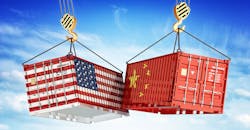Trump Says He’s ‘Ready To Go’ With $500 Billion in Tariffs on All China Imports
by Terrence Dopp
President Donald Trump said he’s "ready to go" with tariffs on $500 billion of Chinese imports, saying the U.S. has been taken advantage of for too long.
"I’m not doing this for politics. I’m doing this to do the right thing for our country," Trump said in a CNBC interview aired Friday. "We are being taken advantage of and I don’t like it."
The $500 billion figure is about the value of Chinese goods imported into the U.S. last year. S&P stock-index futures declined along with the Stoxx Europe 600 gauge after Trump’s comments aired.
The threat is likely to put further strain on a trade dispute between the world’s two biggest economies. China accused American officials of making false accusations Thursday as it fired back against a claim President Xi Jinping is blocking talks with the U.S. Earlier, White House Economic Adviser Larry Kudlow said Xi has no intention of making a deal over trade with the Trump administration.
Trump earlier this month imposed 25% tariffs on $34 billion of Chinese goods, with another $16 billion to follow soon. The administration has also released a list of 10% tariffs on an additional $200 billion of Chinese goods, which could take effect as early as next month. China retaliated on the first wave of tariffs by slapping duties on the same dollar amount of U.S. imports, and Beijing has said it’ll fight against any further U.S. actions.
China imports far less from the U.S., buying about $130 billion in American goods last year, so it doesn’t have as much to leverage with tariffs, but it could use other measures to hit trade such as tightening regulatory oversight.
Trump authorized the tariffs after an investigation he ordered by the U.S. Trade Representative’s office found that China was violating intellectual property rules and forcing American companies operating in China to hand over their technology secrets to gain access to the market. Chinese Commerce Ministry spokesman Gao Feng last week called those accusations “groundless” and said that the U.S. trade penalties contravene rules at the World Trade Organization.
Trade discussions aimed at defusing tensions between the U.S. and China have stalled, and Treasury Secretary Steven Mnuchin said the U.S. would only be willing to get back to the table if China agrees to deepen structural changes to its economy.
The International Monetary Fund warned earlier this week that escalating trade tensions are threatening to derail a global upswing. If threatened trade barriers become reality, global output could drop by about 0.5% below its projected level by 2020, IMF Chief Economist Maurice Obstfeld said. The U.S. economy would be “especially vulnerable,” given it would be the focus of retaliation in a tit-for-tat conflict, Obstfeld said.
The Trump administration has also angered key allies by imposing tariffs of steel and aluminum imports earlier this year. On Thursday, automakers and vehicle-making nations such as Mexico criticized the administration’s study into whether auto imports pose a risk to national security, which could lead to tariffs.
An IMF analysis shows that potential U.S. duties on foreign cars represent a greater risk to the global economy than the tariffs the Trump administration is considering on Chinese imports.
About the Author
Bloomberg
Licensed content from Bloomberg, copyright 2016.
